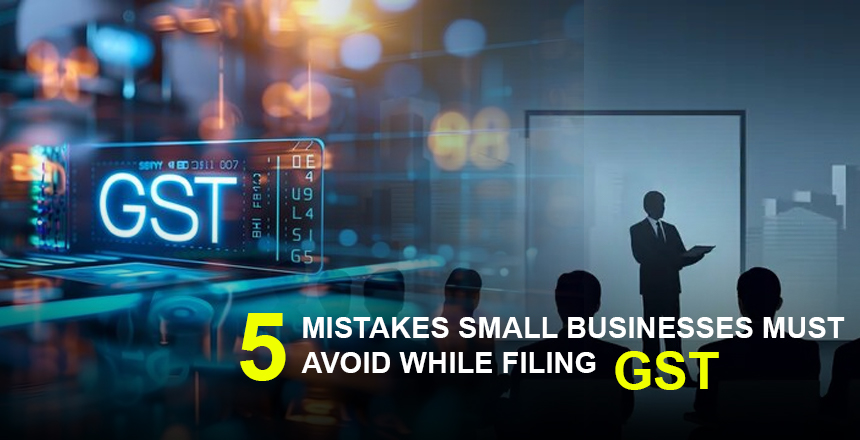Small change for India—understanding the transformation brought about by the Goods and
Services Tax (GST) to business. The current tax structure is easier to take now: small business
entity undertakings can more easily adhere to the taxation law and regulation as is in today’s
implementation of the GST. However, this has led to many small business entities making
mistakes common to them while filing their GST returns. So let us explore the most crucial ones
in this blog post to learn about five common GST filing mistakes small businesses should avoid.
Mistake #1: Unfortunately, additional account registration and changes to them may contain incorrect information.
One of the major cardinal sins that small businesses need to steer clear of is offering either
wrong or half-baked registration information while registering for GST. There are certain
conditions that have to be adhered to as you register for GST, such as name and address,
Permanent Account Number, etc.
Registration applications supplied with inaccurate or partial registration details can lead to
rejections of GST or even make the business owner liable to criminal prosecution. At the time of
GST registration, it is very important to check all the information being registered or making a
mistake in those, if you have done so at the initial level.
Mistake 2: Increasing the occurrence of stock loss due to ineffective record-keeping
Record keeping is invaluable, especially to those who are running their businesses under the
GCT act. Small businesses need to maintain the proper records of all of their sales made,
purchases made, and the ITC claimed. Lack of records may lead to the variation of GST returns,
which leads to penalties and charges.
Otherwise, they will have to guarantee that they keep proper record keeping in the form of a
manual book or using an accounting application. It is also required to keep all the books of
accounts in a safe rack, including invoices, receipts, and other relevant papers, and if they are
requested by the GST authorities, they must be produced.
Mistake 3: Incorrect filing of returns
One of the biggest blunders that small businesses commit is filing wrong GST returns. There are
several possible reasons for incorrect returns: they can be entered wrong, calculated wrong, or
ITC is not available.
In order to avoid such a mistake, the businesses need to be very keen and particularly accurate
when calculating the taxable turnover and other details that they are required to enter in their
GST returns. The second thing that also needs to be done is the validation on how these returns
that were made, ITC claims, should also be in compliance with the GST law and the provisions.
If a business detected that its GST returns had been filed in a wrong manner, then it is obliged
to amend the return within the following time-prescribed limits.
Mistake 4: Delay in filing returns
Delaying the filing of GST returns is another mistake that most small businesses end up making
due to failure to file GST returns within the stipulated time. Delays in filing returns can lead to
late filing fees and also can lead to a suspension of the GST registration.
Thus it is imperative for any business to monitor the dates for filing GST returns in order to avoid
incurring the penalties of late submission. If a registered business is unable to file their returns
within the stipulated time, then it has to apply for an extension of the time limit with the proper
application form and send the same to the appropriate officer of the GST department.
Mistake 5: Incorrect claim of ITC
ITC, or Input Tax Credit, integral to the GST structure, allows the business to recover the GST
charged on the input received by the business. But it is found that many small business
organizations commit mistakes while claiming ITC, and the GST authorities may reject their
claims.
However, care should be taken not to fall into this error when claiming ITC, as it is mandatory for
businesses to follow the provisions of the GST law together with the related laws. This means
that the ITC claimed is the ITC that matches the GST invoices and the other documents and the
timing of claiming it in the specified time.
Conclusion
GST compliance has become a significant component in the operation of a small business
venture in India. If any of these common GST filing mistakes are avoided, then a small business
can ensure it remains cautious of the GST law and thus stay out of penalties, accruing of
interest, and other related repercussions.
In other words, it is crucial to comprehend the need for proper registration information, records,
brilliant returns filing, return due dates, and the right ITC while continuing a successful small
business under the GST regime. However, by following these easy steps, firms can easily
prepare and file GST and avoid many hassles to concentrate on their business.








